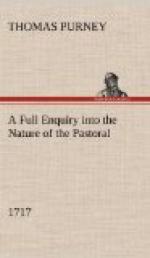I need not instance in the tedious Descriptions of Theocritus, Ovid and Spencer. But certainly, if long Descriptions are faulty in Epick Poetry, as they prevent the Curiosity of the Reader, and leave him nothing to invent, or to imploy his own Mind upon, they are in Pastoral much more disagreeable. Tho’ if any thing would excuse a long Description, there is in Ovid and Spencer, that inimitable Delightfulness, which would make ’em pass. Virgil has no Descriptions in his Pastorals so long as Spencer, and Heavens deliver us if he had; for as ’tis, I can better read the longest of Spencer’s, than the shortest of his, in his Pastorals.
SECT. 2.
The proper Length for Descriptions adjusted, from several Considerations.
What I have laid down seem’s in its self plain and evident; but because Rapin, and some other Criticks, famous for the Niceness of their Judgments, have made it a considerable Question, and at last own’d themselves unable to decide it, I shall further consider the Matter.
’Tis best, I think, only just to exhibit the Picture of an Object to the Reader’s Mind; for if ’tis rightly set and well given, he will himself supply the minute Particulars better to please himself than any Poet can do; as no different Fancies are equally delighted with one and the same thing, the Poet in an extended Description must needs hit upon many Circumstances not pleasant to every Fancy; even tho’ he touches all the best Particulars. But if the Poet only set’s the Image in the finest Light, by enumerating two or three Circumstances, the Reader’s Mind in that very instant it sees the Image or Picture, fill’s up all the Omissions with such Particulars, as are most suitable to it’s own single Fancy. Which farther conceives something beyond, and something out of the way, if all is not told. Whereas descending to Particulars cool’s the Mind, which in those Cases ever finds less than it expected.
To instance in Painting, for that’s the same. When I first cast my Eye on a beauteous Landscape, and take in a View of the whole and all it’s parts at once, I am in Rapture, not knowing distinctly what it is that pleases me; but when I come to examine all the several Parts, they seem less delightful. Pleasure is greatest if we know not whence it proceeds. And such is the Nature of Man, that if he has all he desires he is no longer delighted; but if ought is with-held, he is still in Eagerness, and full of Curiosity.
Besides, Descriptions in Pastoral should be particularly short, because it draw’s into Description nought but the most Common tho’ the most Beautiful of Nature’s Works: Whereas Epick Poetry, whose Business is to Astonish, represents Monsters and Things unheard of before, and a Polyphemus or a Cyclops will bear, nay require, a more particular Description, than a beauteous Grott, or




